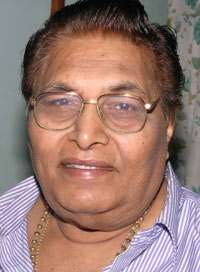M. P. Shankar
| M. P. Shankar | |
|---|---|
 | |
| Born |
20 August 1935.[1] Mysore, Kingdom of Mysore, British India |
| Died |
17 July 2008 (aged 72)[2] Mysore, Karnataka [3] |
| Cause of death | Bone cancer |
| Nationality | Indian |
| Occupation | Actor, film director, producer, screenwriter |
| Spouse(s) | Manjula |
| Children | 3 |
M. P. Shankar (Kannada: ಎಮ್. ಪಿ. ಶಂಕರ್) (20 August 1935 – 17 July 2008) was a veteran Kannada film actor. He acted in films like Satya Harishchandra as 'Veera Baahu', Bhootayyana Maga Ayyu, Ratnamanjari etc.
He produced the film Gandhada Gudi starring Rajkumar. He died on 17 July 2008 in Mysore.[4]
Shankar became famous for his rich voice and strong build. He dominated the villain space in the Kannada film industry for nearly a decade. He is also known as a director. All his films carried a message and many of them like Gandhada Gudi (starring Rajkumar and Vishnuvardhan) were strong commentaries on dwindling forests and fate of wild animals. He was the great lover of wild animals and forest all in his films he used to give message regarding wild life protection.
Early life
Shankar was the third son of Puttalingappa and Gangamma. His father ran a handloom textile industry. Shankar had his primary and secondary education in Dalvoy School and higher secondary education in Banumaiah's High School. His family got into financial crisis due to losses at textile industry. He could not even appear for SSLC exams because of financial problems. He worked as a daily wager in the then Mysore Electricity Board.[1]
Career
Shankar started his career as a Foundry man in the Railway workshop at Mysore in 1955 on a monthly wage of Rs. 80. This iron grinding work affected his body. Shankar, who practised wrestling, participated in the Dasara wrestling competition in 1956 and received title from the then Chief Minister B. D. Jatti. He dreamt of winning the “Sri Mysore” wrestling title. But the wrestling competition was suspended for three years from 1957, following the violence which broke out during the competition that year, and as such his dream of winning the “Sri Mysore” title remained unfulfilled. His acting talent came to light when he played the role of Kadu Kuruba in the diamond jubilee celebration of Banumaiah's Institutions and received a prize from Sri Jayachamaraja Wadiyar.
He formed a drama troupe under the banner Bharani Kalavidaru and enacted plays such as Gadayuddha, Yechchama Nayaka, Yelahanka Bhoopala and Raja Gopichand throughout the State.
M. P. Shankar made his entry into films in 1962 as a villain in the film Ratnamanjari, directed by Hunsur Krishnamurthy and made a name for himself in the cine industry. He earned the distinction of acting in 108 films. Shankar acted as a villain in films such as Veera Sankalpa, Kadina Rahasya, Naari Munidare Maari, Gandhada Gudi, Rama Lakshmana and Bhootayyana Maga Ayyu and with his flawless dialogues, clear voice and acting talent, made an indelible mark in the minds of the audience. Some of the roles he had played are only typical of Shankar.
Shankar started his own production unit in 1968 under the banner “Bharani Chitra”. He began creating awareness about environment and wildlife through his films like Kaadina Rahasya, Gandhada Gudi, Rama Lakshmana, Mrugalaya.
Filmography
| Year | Film | Role | Notes |
|---|---|---|---|
| 1962 | Ratnamanjari | Debut film | |
| 1965 | Satya Harishchandra | Veera Bahu | |
| 1967 | Parvathi Kalyana | Tarakasura | |
| 1967 | Gange Gowri | shani deva | |
| 1968 | Mannina Maga | ||
| 1969 | Mayor Muthanna | ||
| 1971 | Nyayave Devaru | ||
| 1972 | Naagarahaavu | Pailwaan (wrestler) who trains Ramachari in his 'garadi mane' | |
| 1973 | Gandhada Gudi | ||
| 1974 | Bhootayyana Maga Ayyu | Bhootayya | |
| 1975 | Mayura | Rangajetti | |
| 1978 | Kiladi Jodi | ||
| 1980 | Narada Vijaya | ||
| 1989 | Avane Nanna Ganda | Appaji | |
| Kaadina Rahasya [5] | Producer | ||
| 1991 | Gandu Sidigundu | ||
| 1991 | Halli Rambhe Belli Bombe | Producer, actor | |
| Kaadina Raja | Producer | ||
| Mrugalaya [5] | Producer | ||
| Onde Guri | Producer | ||
| Vijaya Khadga | Producer | ||
| Kempu Soorya | Producer | ||
| Srimaan | Producer | ||
| 1994 | Gandhada Gudi Part 2 | ||
Death
He died on 17 July 2008 after a prolonged illness at his residence Manjunatha Nilaya in Vijayanagar in Mysore city. He is survived by his wife Manjula, son Tilak and daughter Shobha. The last rites were held with full state honours in Mysore on 18 July.[1]